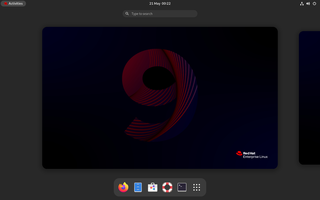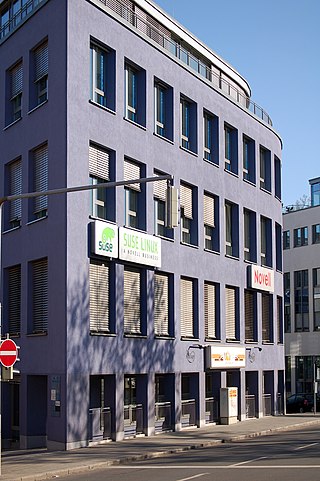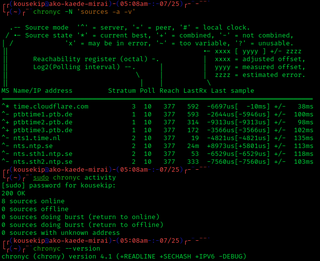Related Research Articles

Red Hat, Inc. is an American software company that provides open source software products to enterprises and is a subsidiary of IBM. Founded in 1993, Red Hat has its corporate headquarters in Raleigh, North Carolina, with other offices worldwide.

YaST is a Linux operating system setup and configuration tool.
Red Hat Network is a family of systems-management services operated by Red Hat. RHN makes updates, patches, and bug fixes of packages included within Red Hat Linux and Red Hat Enterprise Linux available to subscribers. Other available features include the deployment of custom content to, and the provisioning, configuration, reporting, monitoring of client systems.

Red Hat Enterprise Linux (RHEL) is a commercial Linux distribution developed by Red Hat for the commercial market. Red Hat Enterprise Linux is released in server versions for x86-64, Power ISA, ARM64, and IBM Z and a desktop version for x86-64. Fedora Linux and CentOS Stream serve as its upstream sources. All of Red Hat's official support and training, together with the Red Hat Certification Program, focuses on the Red Hat Enterprise Linux platform.
Technical variations of Linux distributions include support for different hardware devices and systems or software package configurations. Organizational differences may be motivated by historical reasons. Other criteria include security, including how quickly security upgrades are available; ease of package management; and number of packages available.

SUSE Linux Enterprise (SLE) is a Linux-based operating system developed by SUSE. It is available in two editions, suffixed with Server (SLES) for servers and mainframes, and Desktop (SLED) for workstations and desktop computers.

SUSE is a German-based multinational open-source software company that develops and sells Linux products to business customers. Founded in 1992, it was the first company to market Linux for enterprise. It is the developer of SUSE Linux Enterprise and the primary sponsor of the community-supported openSUSE Linux distribution project. While the openSUSE "Tumbleweed" variation is an upstream distribution for both the "Leap" variation and SUSE Linux Enterprise distribution, its branded "Leap" variation is part of a direct upgrade path to the enterprise version, which effectively makes openSUSE Leap a non-commercial version of its enterprise product.

Oracle Linux is a Linux distribution packaged and freely distributed by Oracle, available partially under the GNU General Public License since late 2006. It is compiled from Red Hat Enterprise Linux (RHEL) source code, replacing Red Hat branding with Oracle's. It is also used by Oracle Cloud and Oracle Engineered Systems such as Oracle Exadata and others.
This is a comparison of notable free and open-source configuration management software, suitable for tasks like server configuration, orchestration and infrastructure as code typically performed by a system administrator.
Btrfs is a computer storage format that combines a file system based on the copy-on-write (COW) principle with a logical volume manager, developed together. It was founded by Chris Mason in 2007 for use in Linux, and since November 2013, the file system's on-disk format has been declared stable in the Linux kernel.

RPM Package Manager (RPM) is a free and open-source package management system. The name RPM refers to the .rpm file format and the package manager program itself. RPM was intended primarily for Linux distributions; the file format is the baseline package format of the Linux Standard Base.
In computing, Red Hat Satellite is a systems-management product by the company Red Hat which allows system administrators to deploy and manage Red Hat Enterprise Linux (RHEL) hosts.

OpenShift is a family of containerization software products developed by Red Hat. Its flagship product is the OpenShift Container Platform — a hybrid cloud platform as a service built around Linux containers orchestrated and managed by Kubernetes on a foundation of Red Hat Enterprise Linux. The family's other products provide this platform through different environments: OKD serves as the community-driven upstream, Several deployment methods are available including self-managed, cloud native under ROSA, ARO and RHOIC on AWS, Azure, and IBM Cloud respectively, OpenShift Online as software as a service, and OpenShift Dedicated as a managed service.
CloudStack is open-source Infrastructure-as-a-Service cloud computing software for creating, managing, and deploying infrastructure cloud services. It uses existing hypervisor platforms for virtualization, such as KVM, VMware vSphere, including ESXi and vCenter, XenServer/XCP and XCP-ng. In addition to its own API, CloudStack also supports the Amazon Web Services (AWS) API and the Open Cloud Computing Interface from the Open Grid Forum.
Ansible is a suite of software tools that enables infrastructure as code. It is open-source and the suite includes software provisioning, configuration management, and application deployment functionality.

RStudio is an integrated development environment for R, a programming language for statistical computing and graphics. It is available in two formats: RStudio Desktop is a regular desktop application while RStudio Server runs on a remote server and allows accessing RStudio using a web browser. The RStudio IDE is a product of Posit PBC.
kGraft is a feature of the Linux kernel that implements live patching of a running kernel, which allows kernel patches to be applied while the kernel is still running. By avoiding the need for rebooting the system with a new kernel that contains the desired patches, kGraft aims to maximize the system uptime and availability. At the same time, kGraft allows kernel-related security updates to be applied without deferring them to scheduled downtimes. Internally, kGraft allows entire functions in a running kernel to be replaced with their patched versions, doing that safely by selectively using original versions of functions to ensure per-process consistency while the live patching is performed.
kpatch is a feature of the Linux kernel that implements live patching of a running kernel, which allows kernel patches to be applied while the kernel is still running. By avoiding the need for rebooting the system with a new kernel that contains the desired patches, kpatch aims to maximize the system uptime and availability. At the same time, kpatch allows kernel-related security updates to be applied without deferring them to scheduled downtimes. Internally, kpatch allows entire functions in a running kernel to be replaced with their patched versions, doing that safely by stopping all running processes while the live patching is performed.

chrony is an implementation of the Network Time Protocol (NTP). It is an alternative to ntpd, a reference implementation of NTP. It runs on Unix-like operating systems and is released under the GNU GPL v2. It is the default NTP client and server in Red Hat Enterprise Linux 8 and SUSE Linux Enterprise Server 15, and available in many Linux distributions.

Rocky Linux is a Linux distribution developed by Rocky Enterprise Software Foundation, which is a privately owned benefit corporation that describes itself as a "self-imposed not-for-profit". It is intended to be a downstream, complete binary-compatible release using the Red Hat Enterprise Linux (RHEL) operating system source code. The project's aim is to provide a community-supported, production-grade enterprise operating system. Rocky Linux, along with RHEL and SUSE Linux Enterprise (SLE), has become popular for enterprise operating system use.
References
- ↑ "GitHub Spacewalkproject Home". GitHub . 2020-06-02. Retrieved 2020-06-28.
- ↑ "Uyuni: Forking Spacewalk with Salt and Containers". 2020-11-12. Retrieved 2020-11-12.
- ↑ "GitHub Spacewalkproject Home". GitHub . 2017-01-13. Archived from the original on 2019-07-16. Retrieved 2017-02-01.
- ↑ Vora, Zeal (29 December 2017). Enterprise Cloud Security and Governance. Packt. ISBN 9781788298513. Pentest & Patch Management.
- ↑ "OpenSCAP Auditing of client systems". docs.oracle.com. Retrieved 2017-02-01.
- ↑ "Configuring Inter-Server Synchronization". docs.oracle.com. Retrieved 2017-02-02.
- ↑ "Installing and Upgrading Spacewalk Proxies". docs.oracle.com. Archived from the original on 2017-11-07. Retrieved 2017-02-02.
- ↑ "Spacewalk API FAQ". Archived from the original on 2017-02-02. Retrieved 2017-01-31.
- ↑ "Introduction to Using Oracle Unbreakable Linux Network". Oracle Linux Blog. 2015-02-25. Archived from the original on 2016-08-09. Retrieved 2017-02-01.
- ↑ "PostgreSQL – spacewalk". Fedorahosted.org. 2012-03-07. Archived from the original on 2013-09-08. Retrieved 2012-10-14.
- ↑ "Spacewalk 2.0 provided to manage Oracle Linux systems". Senior Vice President of Linux and Virtualization Engineering. 2013-11-13. Archived from the original on 2016-07-01. Retrieved 2017-01-31.
- ↑ "Oracle Linux Manager". docs.oracle.com.
- ↑ "Friday Spotlight: Spacewalk 2.2 on public yum and Oracle Instant Client on ULN". Oracle's Linux Blog. 2015-01-30. Archived from the original on 2017-02-07. Retrieved 2017-02-07.
- ↑ "Spacewalk client released for Oracle Linux 7". Oracle's Linux Blog. 2014-11-04. Archived from the original on 2015-09-10. Retrieved 2017-02-01.
- ↑ Miller, Avi (8 May 2017). "Announcing the release of Spacewalk 2.6" . Retrieved 24 February 2018.
- ↑ Miller, Avi (16 Apr 2017). "Announcing the release of Spacewalk 2.7". Archived from the original on 26 September 2018. Retrieved 26 September 2018.
- ↑ Miller, Avi (5 August 2020). "Announcing the release of Spacewalk 2.10 for Oracle Linux" . Retrieved 5 August 2020.
- ↑ "Oracle Spacewalk Documentation Home". oracle.com. Archived from the original on 2017-10-20. Retrieved 2017-01-30.
- ↑ "Novell Rolls Out Advanced Linux Systems Management Solution". Novell.com. 2011-03-03. Archived from the original on 2012-10-09. Retrieved 2012-10-14.
- ↑ "Uyuni: Forking Spacewalk with Salt and Containers". 2018-05-26. Archived from the original on 2018-08-26. Retrieved 2018-08-23.
- ↑ "We're back to Earth, and the Earth is flat! Welcome Uyuni!". 2018-06-02. Archived from the original on 2018-08-23. Retrieved 2018-08-23.
- ↑ "First Public Beta for SUSE Manager 4.0!". 2019-03-14. Archived from the original on 2019-04-02. Retrieved 2020-08-20.
- ↑ "Project Spacewalk Announcement". Red Hat. 2008-06-02. Archived from the original on 2019-07-21. Retrieved 2017-01-31.
- ↑ "Red Hat stretches Linux system management tentacle". The Register . 2009-09-02. Archived from the original on 2014-02-21. Retrieved 2014-02-05.
- ↑ "(Spacewalk) Frequently Asked Questions". Red hat. 2015. Archived from the original on 2016-12-22. Retrieved 2017-02-01.
- ↑ "Satellite version 6 with Puppet, git, Foreman, Katello, Pulp and Candlepin included - questions on using Puppet". Archived from the original on 2014-11-06. Retrieved 2014-11-06.
- ↑ "Spacewalk: Free & Open Source Linux Systems Management". redhat.com. Archived from the original on 2010-04-17. Retrieved 2012-10-14.
- ↑ "Red Hat Satellite 5: Important information and changes". Red Hat. 2020-05-19. Retrieved 2020-06-28.
- ↑ "Spacewalk 2.10 Release notes". Github. Retrieved 18 March 2020.
- ↑ "Spacewalk 2.9 Release notes". Github. Archived from the original on 3 August 2019. Retrieved 16 September 2019.
- ↑ "Spacewalk 2.8 Release Notes". Github. Archived from the original on 16 September 2019. Retrieved 16 September 2019.
- ↑ "Spacewalk 2.7 Release Notes". Github. Archived from the original on 16 September 2019. Retrieved 16 September 2019.
- ↑ "Spacewalk 2.6 Release Notes". Github. Archived from the original on 3 August 2019. Retrieved 16 September 2019.
- ↑ "Spacewalk 2.5 Release Notes". Github. Archived from the original on 3 August 2019. Retrieved 16 September 2019.
- ↑ "Spacewalk 2.4 Release Notes". Github. Archived from the original on 16 September 2019. Retrieved 16 September 2019.
- ↑ "Spacewalk 2.3 Release Notes". Github. Archived from the original on 3 August 2019. Retrieved 16 September 2019.
- ↑ "Spacewalk 2.2 Release Notes". Github. Archived from the original on 3 August 2019. Retrieved 16 September 2019.
- ↑ "Spacewalk 2.1 Release Notes". Github. Archived from the original on 3 August 2019. Retrieved 16 September 2019.
- ↑ "Spacewalk 2.0 Release Notes". Github. Archived from the original on 3 August 2019. Retrieved 16 September 2019.
- ↑ "Spacewalk 1.9 Release Notes". Github. Archived from the original on 3 August 2019. Retrieved 16 September 2019.
- ↑ "Spacewalk 1.8 Release Notes". Github. Archived from the original on 16 September 2019. Retrieved 16 September 2019.
- ↑ "Spacewalk 1.7 Release Notes". Github. Archived from the original on 16 September 2019. Retrieved 16 September 2019.
- ↑ "Spacewalk 1.6 Release Notes". Github. Archived from the original on 3 August 2019. Retrieved 16 September 2019.
- ↑ "Spacewalk 1.5 Release Notes". Github. Archived from the original on 16 September 2019. Retrieved 16 September 2019.
- ↑ "Spacewalk 1.4 Release Notes". Github. Archived from the original on 16 September 2019. Retrieved 16 September 2019.
- ↑ "Spacewalk 1.3 Release Notes". Github. Archived from the original on 16 September 2019. Retrieved 16 September 2019.
- ↑ "Spacewalk 1.2 Release Notes". Github. Archived from the original on 16 September 2019. Retrieved 16 September 2019.
- ↑ "Spacewalk 1.1 Release Notes". Github. Archived from the original on 16 September 2019. Retrieved 16 September 2019.
- ↑ "Spacewalk 1.0 Release Notes". Github. Archived from the original on 16 September 2019. Retrieved 16 September 2019.
- ↑ "Spacewalk 0.8 Release Notes". Github. Archived from the original on 16 September 2019. Retrieved 16 September 2019.
- ↑ "Spacewalk 0.7 Release Notes". Github. Archived from the original on 16 September 2019. Retrieved 16 September 2019.
- ↑ "Spacewalk 0.6 Release Notes". Github. Archived from the original on 16 September 2019. Retrieved 16 September 2019.
- ↑ "Spacewalk 0.5 Release Notes". Github. Archived from the original on 16 September 2019. Retrieved 16 September 2019.
- ↑ "Spacewalk-announce-list — Spacewalk 0.4 is here!". www.redhat.com. Archived from the original on 2019-07-26. Retrieved 2019-09-16.
- ↑ "Spacewalk-list — Announcing Spacewalk 0.3". www.redhat.com. Archived from the original on 2019-07-21. Retrieved 2019-09-16.
- ↑ "Spacewalk-list — Spacewalk 0.2 available". www.redhat.com. Archived from the original on 2019-07-21. Retrieved 2019-09-16.
- ↑ "Spacewalk-list — Introducing Project Spacewalk". www.redhat.com. Archived from the original on 2019-07-21. Retrieved 2017-02-02.
- ↑ Midtrapanon, Soranut; Wills, Gary (2 May 2019). Linux patch management: With security assessment features (PDF). 4th International Conference on Internet of Things, Big Data and Security. Heraklion, Crete. pp. 270–277. Archived from the original on 17 September 2019.
- ↑ "Spacewalk Home". Red Hat. 2015. Archived from the original on 2016-11-19. Retrieved 2017-02-02.